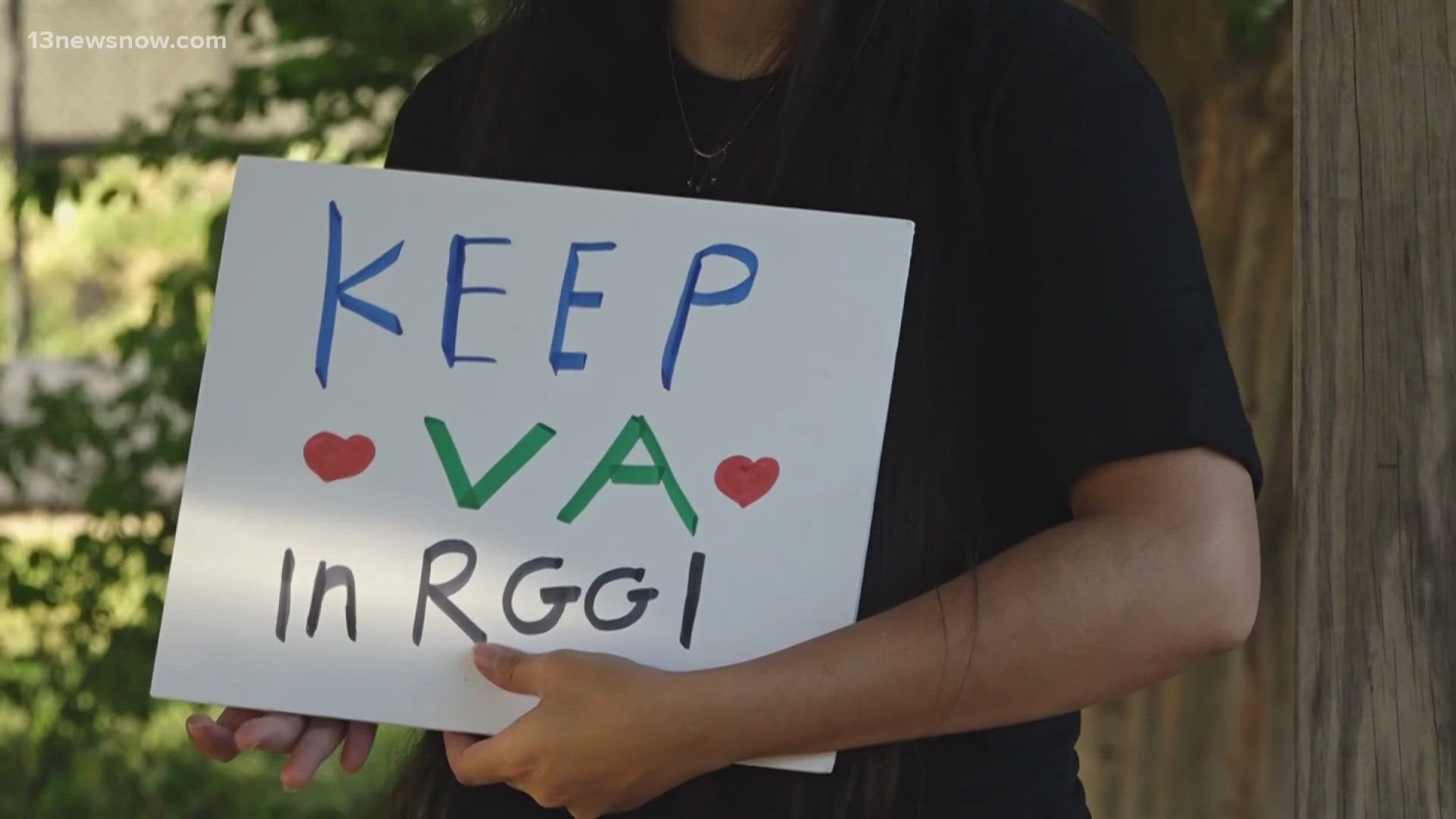RICHMOND, Va. — The Virginia Air Pollution Control Board took another step toward achieving Gov. Glenn Youngkin's plan to withdraw the state from the Regional Greenhouse Gas Initiative (RGGI) on Wednesday morning.
The board voted 4-to-1 in favor of a proposed regulation repealing Virginia's participation in the program capping carbon dioxide emissions from power plants alongside 10 other states.
Two board members abstained from the vote, citing their belief that the board isn't legally allowed to remove Virginia from RGGI without a new law passed by the General Assembly and signed by the governor.
The board's vote came more than a month after the public comment period closed on the Youngkin administration's Notice of Intended Regulatory Action (NOIRA), a public notification that a regulatory change is being considered.
During the period, which lasted from Sept. 26 to Oct. 26, 838 public comments were submitted, 51 of which were in favor of the notice and 730 of which were against, according to Travis Voyles, the acting Virginia secretary of natural and historic resources.
Eleven of the comments against were made by prominent environmental groups, including the Chesapeake Bay Foundation and the Nature Conservancy. Six came from local governments, including the cities of Arlington, Alexandria, Hampton, and Charlottesville.
Many were concerned that withdrawing from RGGI would gut funding for the Community Flood Preparedness Fund (CFPF), which provides grants for flood mitigation projects across the state and is funded by Virginia's participation in RGGI.
"Cities, towns, and counties need substantial resources to adapt to changing realities of flooding driven by sea level rise, as well as shifting patterns of precipitation and storm events," the City of Hampton wrote in its comment.
The City of Hampton urged the Youngkin administration "build upon the success of the CFPF" by keeping Virginia in RGGI or making sure there's a dedicated source of revenue for the fund.
In a statement sent to 13News Now, Voyles said the board's vote was "a great step forward," while addressing concerns about funding for programs that come from RGGI.
"A regressive and direct household energy tax tied to participation in RGGI is not necessary to fund important programs on resiliency and energy efficiency," Voyles wrote. "The Administration will continue to work with the General Assembly and stakeholders to provide direct funding and coordination for flood resiliency in a way that is transparent and not a hidden tax on Virginians."
Board members concerned with legality of regulation
It's legally ambiguous if Virginia can leave RGGI without new legislation and not solely by regulatory action, because of provisions in the Clean Energy and Community Flood Preparedness Act.
Board member Hope Cupit asked Voyles if he agreed that Virginia's participation is a mandate by law, citing a 2020 document from the Virginia Department of Environmental Quality stating RGGI was a "directive of the General Assembly."
Voyles responded by saying Virginia's law authorizes but doesn't mandate the state's participation in the program.
Later in the meeting, a representative from Virginia Attorney General Jason Miyares' office said the board was legally allowed to adopt the proposed regulation after reviewing it but didn't specify the rationale.
Ultimately, Cupit abstained from the vote, saying she didn't believe it was legal under the law.
"Given what was presented to us today, and in this forum, I do not feel about voting on this RGGI repeal," Cupit said, adding that she didn't agree with the attorney general's assessment.
Another board member, Dr. Lornel Tompkins, also abstained from the vote over concerns about the legality of the vote.
"I don't really understand it because of the fact that the law was passed by the General Assembly," Tompkins said. "And then we're saying that we have the right to set in motion the repeal of the regulations that help the law to be, or is the implementation of the law."
The Southern Environmental Law Center (SELC), a legal advocacy organization that supports policies to address climate change, echoed the same thing while calling the board's vote disappointing.
"The law requires Virginia’s participation in RGGI, and the administration must abide by the General Assembly’s decision," SELC Senior Attorney Nate Benforado wrote in a statement. "But equally troubling is the fact that the administration appears uninterested in listening to its own residents. The public overwhelmingly opposed this action, but the administration is poised to plow through this irresponsible and unlawful repeal, no matter what people say and no matter the harm to Virginia.”
What happens now?
Following the board's vote, the proposed regulation will need to be approved by Virginia's executive branch and Youngkin. Once that happens, it will be published in the Virginia Register of Regulations for a 60-day public comment period.
The next step is the creation of a final regulation that the board will vote on. If approved, it moves Virginia's executive branch and Youngkin for approval. After approval, the regulation will be published in the Virginia Register and, 30 days later, becomes effective.
Voyles reiterated the regulation would allow the state to leave RGGI by the end of 2023, coinciding with the end of the program's three-year compliance period and contract with the organization that manages the program.
He stressed that the timeline provides regulatory certainty for businesses, as opposed to a hasty withdrawal that could cause disruption to markets.
The full board meeting is available to watch on YouTube.
This story has been updated with additional statements.



